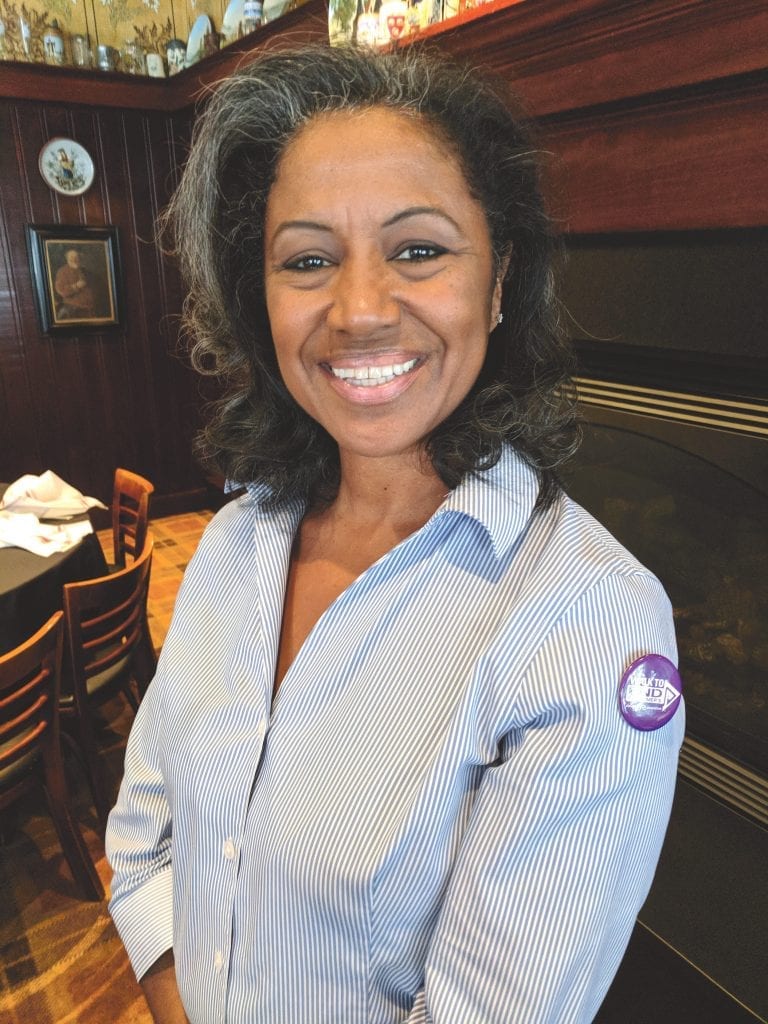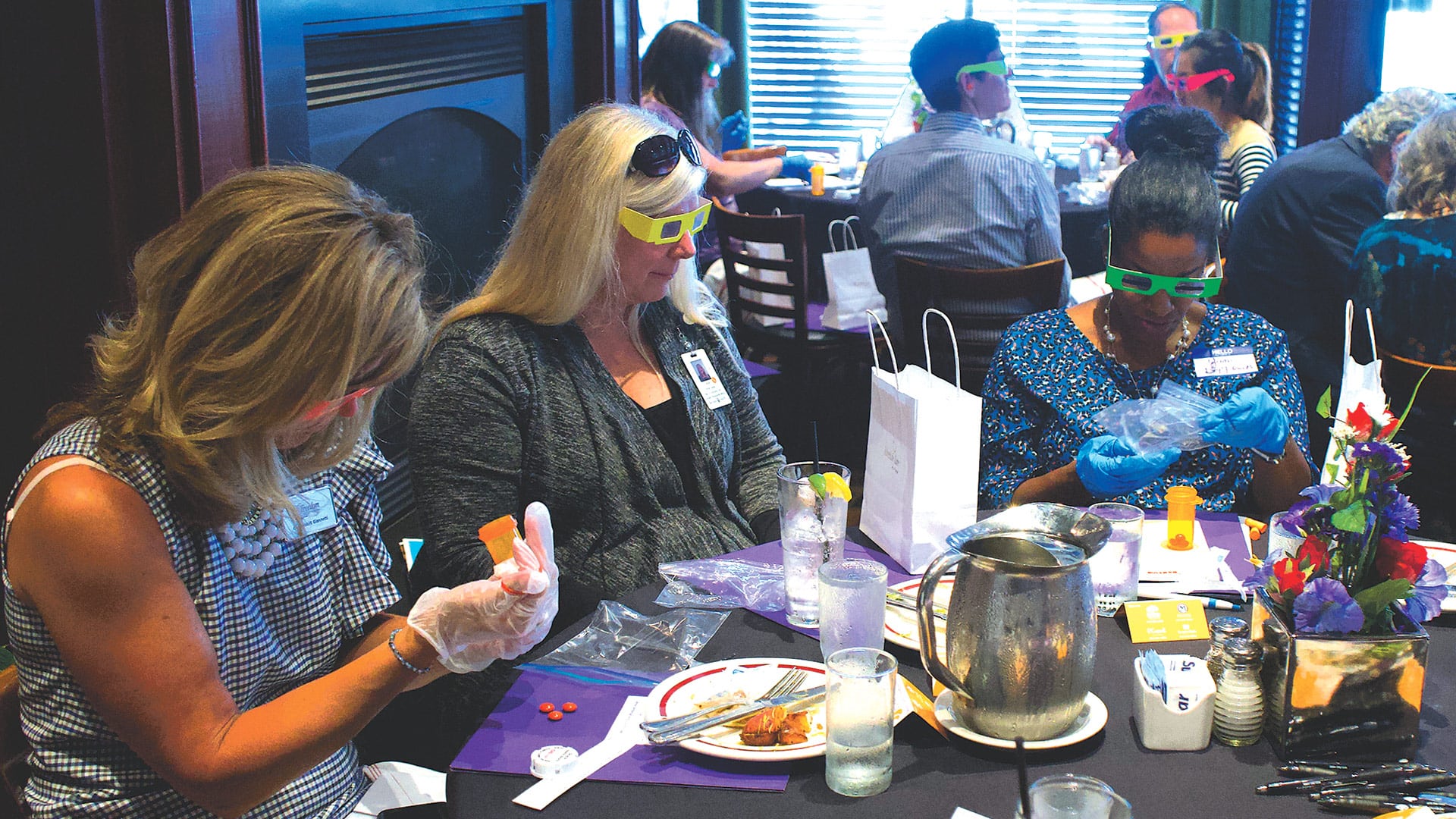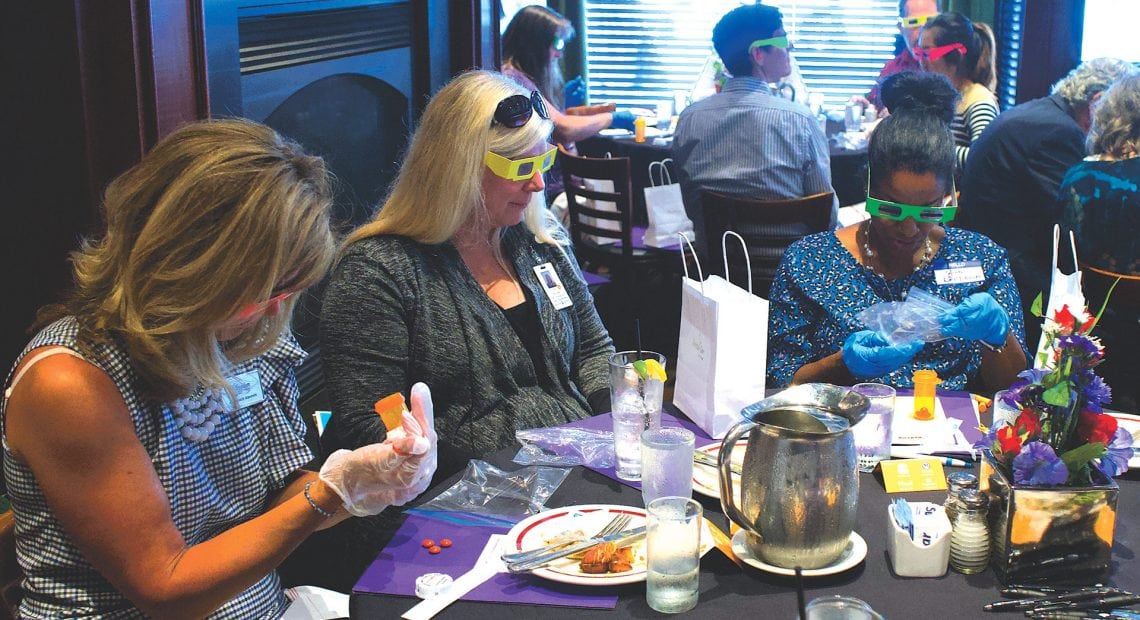In Search of Empathy

Catherine Williamson says empathy is at the heart of the dementia-friendly movement.
Empathy is a quality America can always use more of — and that’s especially true, Catherine Williamson said, when it comes to families struggling with dementia.
“What attracted me to the dementia-friendly movement is being able to help individuals adjust to what’s going on in their lives,” she recently told a group of business leaders, who met for lunch at the Student Prince in Springfield for a presentation by the Springfield Dementia Friendly Coalition.
“It’s about empathy, and some of us are not great at being empathetic,” she went on. “Our lives are fast-paced, and we’ve got a lot going on — kids, jobs, husbands and wives, volunteering. We’ve got so much going on that, sometimes, we forget to stop and think about someone else not being able to move as fast as we can, or understand things the way we can.”
Williamson, a certified dementia practitioner and gerontologist with SilverLife Care at Home, said a goal of the dementia-friendly movement is to educate the community, and even the loved ones of people with dementia, about how daily experiences differ for individuals with that condition — everything from going to the library to visiting a doctor; from having a financial-planning meeting with an attorney to simply eating out at a restaurant.
To demonstrate, she led the lunch attendees in a virtual ‘dementia experience,’ in which participants use common objects to block or hinder their eyesight, hearing, range of hand motion, and other faculties, then try to communicate with each other — again, as a way to create empathy and reinforce the need for dementia-friendly changes in society.
“People with functional limitations are dealing with this constantly,” she said. “Imagine how much this impacts their daily lives, their relationships, getting around, even wanting to be out in the community. If you felt like this all the time, in this impaired state, you’d probably want to stay home, too. We need to think about how to make our communities and businesses and public spaces a little easier to navigate.”
The business leaders at the lunch shared their professional and personal experiences with dementia and learned about what it would mean to make Springfield a dementia-friendly community — a designation that an increasing number of Massachusetts cities and towns have been pursuing, one in which businesses, municipal departments, and other entities make a collective effort that help people who are memory-challenged to function in the community and live independently for as long as possible.
“Sometimes, we forget to stop and think about someone else not being able to move as fast as we can, or understand things the way we can.”
“What can we do as a community to improve the quality of lives?” asked Anna Randall of Greater Springfield Senior Services, one of the coalition members. “Being dementia-friendly means different things to different communities, depending on their populations and what resources they already have. We’re here to ask businesses what we can do to help your clients and make this community dementia-friendly.”
At a Loss
Nearly 5.1 million Americans age 65 and older are living with Alzheimer’s disease, the most common form of dementia, and the number is expected to reach 7.1 million in the next decade. Nearly 60% of people with dementia live in their own communities, and one in seven live alone, creating an urgent need, dementia-friendly advocates say, for communities to support people with dementia and their caregivers.

Attendees of the recent Springfield Dementia Friendly Coalition lunch underwent a virtual ‘dementia experience’ to get a small taste of what’s it’s like to navigate the world with cognitive impairment.
Meghan Lemay, regional manager in the Springfield office of the Alzheimer’s Assoc., said Alzheimer’s disease is a true epidemic, currently the sixth-leading cause of death in the U.S. and the only major disease that has been increasing in incidence — by a 123% rate since 2000, in fact. At the same time, incidences of diseases like cancer and heart disease have been falling.
In addition, she noted, Alzheimer’s is the most expensive disease in America, expected to cost the healthcare system and caregivers some $277 billion in 2018 alone.
“It’s something we have to address on multiple fronts,” Lemay said. “We know it impacts families directly and has a significant emotional impact, but there’s also a significant financial impact for individuals and our communities.”
Springfield, in fact, is disproportionally affected, with a higher rate of dementia than other Massachusetts communities on average. Demographically, meanwhile, the condition affects African-Americans and Latinos at a higher rate than whites.
While individual communities seek the dementia-friendly designation, a state-level organization known as Dementia Friendly Massachusetts is supporting those efforts. On the community level, Randall noted, businesses who go through dementia-friendly training can then display that fact, “to say this company has gone the extra mile to show they care about their community and want to be more inclusive for people caring with dementia.”
“It’s something we have to address on multiple fronts. We know it impacts families directly and has a significant emotional impact, but there’s also a significant financial impact for individuals and our communities.”
Williamson noted that such steps by businesses could include modifying entryways, altering lighting, or changing the ways they interact with customers. And the changes don’t have to be dramatic. For example, a coffee shop in Boston became more dementia-friendly when it complemented its chalkboard menu with large-print menus at the register. “It’s little things like that — different types of things you can do.”
One attendee of the recent lunch in Springfield noted that some businesses have gone the opposite route, citing the increasing use of automated ordering kiosks at McDonald’s and the dominance of self-checkout lanes at Stop & Shop as two developments that can be problematic for certain individuals.
However, on the plus side, many restaurants have embraced the Purple Table training program designed to help visitors with dementia, autism, PTSD, hearing or vision impairment, or other conditions benefit from a more predictable environment and additional accommodations when dining out.
When families make a Purple Table reservation, participating restaurants provide accommodations that work best for that diner, along with extra patience and attention from staff who have been trained to understand different needs and how to best meet them. Those steps might differ depending on the visitor, but the underlying philosophy of empathy and understanding is the same.
Law and Order
The recent lunch gathering was funded by a dementia-friendly capacity-building grant from the Massachusetts Council on Aging under a service incentive grant from the Massachusetts Executive Office of Elder Affairs, allowing the coalition to hold focus-group meetings with local government and public officials, first responders, and members of the business community.
The goal is to make them aware of the issues facing individuals living with dementia, their friends, family, and care partners; to give an overview of the movement; and to elicit their thoughts and engagement in the initiative. In addition, the group will meet with those living with dementia and their care partners.
The coalition chair, Synthia Scott-Mitchell from Springfield Partners for Community Action, noted that “a dementia-friendly community is defined as one that is informed, safe, and respectful of individuals with dementia and their families, and provides supportive options for improved quality of life.”
But legislators can make a difference, too, and recently did, by passing a first-of-its-kind bill — subsequently signed into law by Gov. Charlie Baker — that aims to make life a little easier for individuals with dementia and their families, through a multi-pronged approach.
More than 130,000 people are currently living with Alzheimer’s disease in Massachusetts, and being cared for by more than 337,000 family and friends. According to the Alzheimer’s Assoc., in 2018, Massachusetts will spend more than $1.6 billion in Medicaid costs caring for people with Alzheimer’s.
“Alzheimer’s is the single largest unaddressed public health threat in the 21st century, and we remain on the front lines of this crisis every day here in the Commonwealth,” said Daniel Zotos, director of Public Policy & Advocacy of the Alzheimer’s Assoc., Massachusetts/New Hampshire Chapter. “This legislation follows in the tradition of Massachusetts being a national leader in healthcare, and we commend the governor and Legislature for ensuring everyone impacted by Alzheimer’s gets the quality care and support they deserve.”
Among its mandates, the bill:
• Establishes a comprehensive state plan to address Alzheimer’s disease within the Executive Office of Health and Human Services, while also establishing a permanent advisory council to help coordinate government efforts and ensure that public and private resources are maximized and leveraged;
• Requires curriculum content about Alzheimer’s and other dementias be incorporated into continuing-medical-education programs that are required for granting the renewal of licensure for physicians, physician assistants, registered nurses, and licensed nurse practitioners;
• Ensures proper notification of an Alzheimer’s or dementia diagnosis to the family or legal guardian and provides information on available resources to both the patient and family;
• Requires state hospitals to implement an operational plan for the recognition and management of patients with dementia or delirium; and
• Establishes minimum training standards for social workers in elder protective services, to ensure protection from abuse and exploitation for elders with Alzheimer’s and dementia.
Small Steps, Big Impact
When it comes to making communities more navigable and manageable for people with dementia, every effort helps, Williamson said, noting that the dementia-friendly movement also seeks to raise awareness — often through workplace presentations — of resources available to help families grapping with Alzheimer’s, when they’re not always willing to seek them out because of shame or stigma.
“If we go into your workplace and address your employees, we’re reaching folks that might need help,” she said. “It’s not just about doing the right thing for your customers, but also for your staff — folks who are taking care of their loved ones, but might not want to come forward.”
As the statistics show, those folks are legion. Increasingly, Williamson and her fellow coalition members hope, they are starting to find their communities a little friendlier, in some very important ways.
Joseph Bednar can be reached at [email protected]






